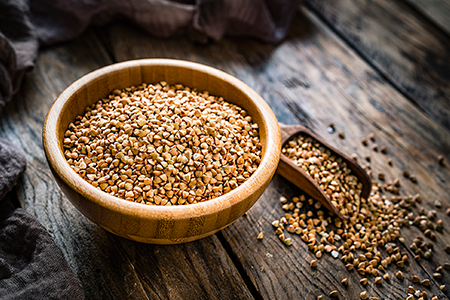In healthy individuals as well as those with dysfunction, controlling daily blood glucose excursions is increasingly seen as a crucial means of minimizing diet-induced biological aging and aiding long-term immune and metabolic function. Chronic stress, along with detrimental eating and lifestyle habits, can rapidly and negatively impair carbohydrate utilization, and increases in insulin resistance may occur long before outward changes are noticed.
Buckwheat is known to contain a broad array of plant nutrients with beneficial effects on lipid and glucose metabolism, including soluble dietary fiber (especially amylose, a resistant starch), rutin, catechins, minerals, and D-chiro-inositol. These phytonutrients variously mediate the actions of insulin, slow the rate of glucose delivery into circulation, and serve as prebiotics for friendly gut microbiota.
In this clinical trial, healthy and diabetic participants established, after overnight fasting, a baseline first- and second-meal glycemic response with a standard white bread breakfast and a controlled lunch. In subsequent weeks, they repeated the two-meal sequence with a buckwheat-based and then a quinoa-based breakfast followed by the same controlled lunch. Glucose levels were recorded at numerous timed intervals after breakfast and lunch. Glycemic indices of the buckwheat and quinoa meals were calculated from the results and incremental area-under-the-curve (AUC) values were calculated for all meals and statistically compared. The second-meal effect is especially important for individuals who wish to more strongly limit their glucose excursions.
Buckwheat Has a Favorable Glycemic Profile

KEY TAKEAWAY:
This clinical study helps establish the gluten-free cereal buckwheat as a food having a low glycemic index against the white bread standard. It additionally demonstrates that buckwheat possesses considerable influence on second-meal as well as first-meal glycemic responses.


